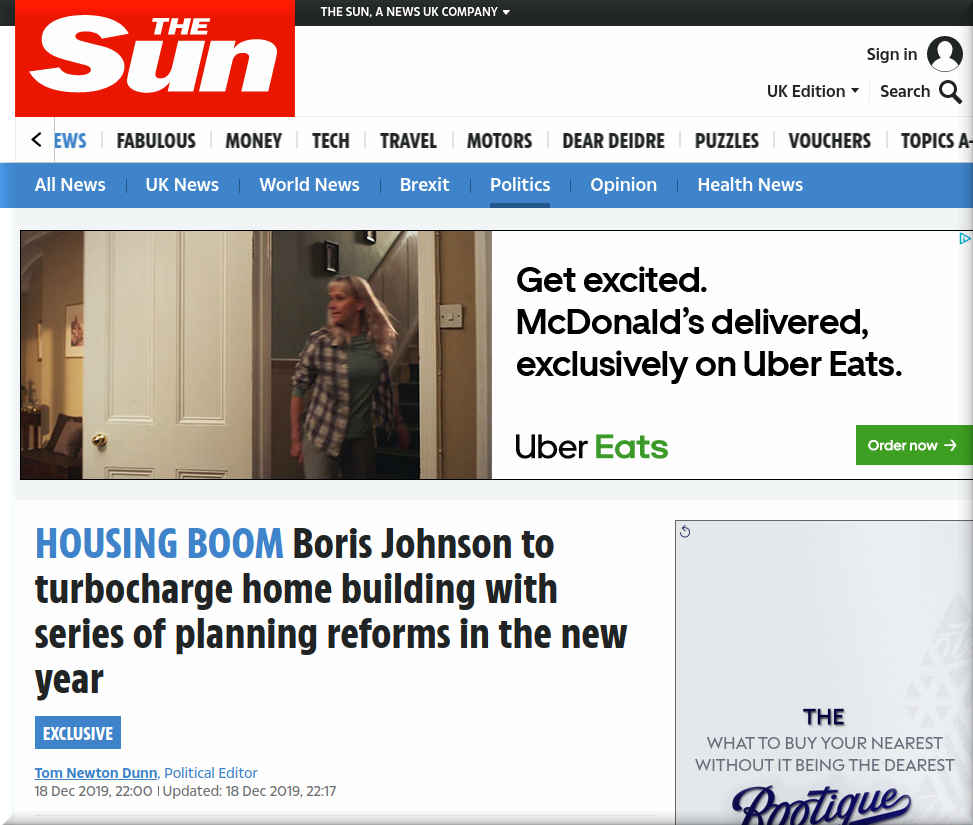
By Sebastian O’Kelly
LKP director
The government idea of allowing freeholders to stick another couple of storeys on residential buildings to “turbo-charge” housebuilding risks derailing the Law Commission’s enfranchisement reforms next month.
The story was floated in The Sun by influential political editor Tom Newton Dunn, presumably as a tasty morsel to small-scale developers and builders. But it would apply equally to all developers and residential freehold owners.
This means that if the proposal becomes law residential freehold owners of blocks of flats will be able to argue hugely inflated values for the freehold in enfranchisement cases.
This directly runs across the Law Commission’s intention of making enfranchisement quicker, simpler and more cost-effective for leaseholders in proposals to be published next month.
In the multi-billion pound smoke-and-mirrors enfranchisement business development potential is one of the reasons freeholders argue that leaseholders should pay more.
The property tribunal frequently rules that the development potential is fanciful or uncertain. This planning reform would make the case of freeholders more powerful.
The Sun writes:
“The rapid assault, expected as early as January, was revealed by the PM’s most senior adviser Dominic Cummings in a briefing to all ministerial aides in No10 on Tuesday night …
“Housing Secretary Robert Jenrick and Chancellor Sajid Javid have been quietly preparing a major overhaul of the system that gives permission to build to liberate up significant new space.
“But there was scant mention of planning reform in the Tories’ election manifesto for fear of upsetting floating voters in key target seats.”
“Top of the list of major changes to the law is allowing developers and homeowners to build upwards, adding up to two extra storeys on homes and blocks of flats without necessarily needing approval.
“Britain’s cities have one of the lowest average heights of housing in the Western world, and that building upwards will create a huge amount of living space immediately.
This is obviously an unintended consequence of the proposal.
It would also be an astonishing reward to speculators in residential freeholds, who have ignored ministers’ pleas that they do the “decent thing” and pay to remove Grenfell and other combustible cladding from their sites.
Not one single speculator in residential freeholds has done so.
As LKP repeatedly points out, speculators in residential freeholds own the income streams of a building. They are not the long-term custodians, and their income is unaffected whether the building is in a good state or disrepair, with flats selling for very little.
Freeholds are routinely sold for around 1-3% of the collective value of a block’s leases, yet the freehold owner makes all the decisions, trousers all the commissions and – with this proposal – sees a huge uplift in value of the development potential of a site.
If the proposal were limited to leaseholder enfranchised blocks – or leaseholders had a share in the uplift in value – the proposal would have potential.
As it is, it has loaded the dice against leaseholders just at the time when the Law Commission is trying to make their lot better.
Oral evidence – Work of the Secretary of State 2019 – 28 Oct 2019
Housing, Communities and Local Government Committee Monday 28 October 2019 : Rt Hon Robert Jenrick MP, Secretary of State, Ministry of Housing, Communities and Local Government. Additionally, seeing as it is over three years since we voted to leave the EU, I am also slightly surprised that plans to have a Shared Prosperity Fund are not slightly more advanced than they appear to be at the moment.
This exchange from before the election between Communities Secretary Robert Jenrick and Helen Hayes, Labour MP for Dulwich and West Norwood is interesting on this idea:
Helen Hayes: In relation to the latest proposal that homeowners should be able to build upwards without reference to the planning system, would you be happy for your next‑door neighbour to extend by two floors without having the opportunity to scrutinise that through the planning system?
Robert Jenrick: Let me answer your second question. Yes, I would be. Like any homeowner, I would have concerns and questions if I learnt that my next-door neighbour wanted to build upwards, but it must be a good thing that, as people’s families expand, they have the ability to expand their home. Our primary focus in that permitted development—of course we have to work out the exact details and consult upon them—will not be on individuals choosing to increase their own detached or terraced property by two floors. It will be residential buildings choosing to move upwards. It might be mansion blocks in London or bigger cities, where the residents come together and choose to build upwards by one or two floors. If done safely and to a high standard, in keeping with the architecture and design of the street, that is a win-win for everybody. [What about the freeholder’s property rights and where do leaseholders fit into this, in law?] The residents will no doubt gain financially and there will be more homes built, which would simply not otherwise have been built.
Helen Hayes: They can do it already through the planning system, which is precisely there to ensure safety and high standards. I previously lived in a block that was extended by a floor after I no longer lived there. That went through the planning system, which is there exactly to ensure that everybody’s safety and amenity is looked after. Do you really think that having permitted development rights for extensions in that way is going to go well?
Robert Jenrick: I believe it will. It will clearly need careful consideration. A permitted development right, as you know, is the Secretary of State providing permission to the applicant, so it is very important that my Department works very carefully through all the unintended consequences and creates a system that is going to work in all eventualities. We will learn the lessons of previous permitted development rights.





 Wellcome Trust ‘wrong’ over exploiting the lease extension racket in its property portfolio, Bottomley tells The Times
Wellcome Trust ‘wrong’ over exploiting the lease extension racket in its property portfolio, Bottomley tells The Times






















Also, what kind of flats? The freeholder across the road is relishing escaping the planning restrictions so he can add a couple of storeys of luxury penthouse flats.. Relaxing the planning rules for smaller flats might help the shortage, relaxing them just so more large luxury flats can be added serves only the delopers’ interests .